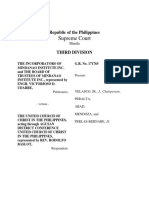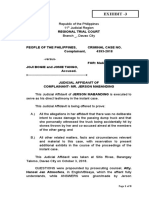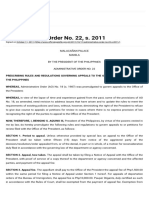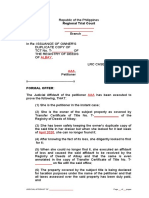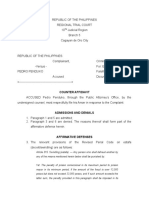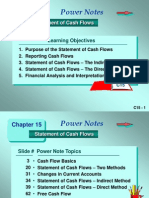Legal Research
Uploaded by
Ron ManLegal Research
Uploaded by
Ron ManLegal Research Project for the Finals (Case Research)
Submitted to: Atty. M. Aguilar Submitted by: Arthur C. Flores LLB1 Rm. 214
CASE NO. 15
X is the liason officer of an office. Among his responsibilities is to make withdrawals, deposits and payments with the banks. One day, he was asked by one of his superiors, Y, to pay the latters credit card bill. The payment was in ten (10) P500bills and was placed in the banks designated pay envelope. Y counted the money, wrote the details of the payment on the envelope (including his name, address and telephone number), sealed it, and gave it to X. X was supposed to proceed to the bank and drop the pay envelope into the banks drop box. Later in the afternoon, a bank representative called Y and informed him that while the pay envelope indicated 10 P500-bills, there were only 9 inside the envelope. The payment that could be credited to him is therefore only P4,500.00 and not P5,000.00.
Facts of the Case: I. Given facts: Whom/ Who are the parties involved X, liason officer of an office Y, one of the superiors of the liason officer Z, the bank representative What Y instructed the X to pay the formers credit card bills. Z called Y informing him that amount placed in the envelope (P5,000) by the supervisor as payment for his credit card bill does not tally with the payment received by the bank (P4,500) When One day the X was asked by his supervisor to pay the latters credit card bill. In the afternoon of the same day, Z called Y to inform him of the discrepancy between the amount reflected in the pay envelope and the actual payment inside. Where The instruction for payment was made at the office. Payment was made at the bank. How Y personally counted ten (10) P500-bills and placed it in the banks designated pay envelope. He indicated his name, address and telephone number in the envelope, sealed it and gave it to X. X is supposed to proceed to the bank and drop the pay envelope into the banks drop box. Y discovered the discrepancy between the amount in the envelope and the amount written in the envelope when Z called him for the said purpose. II. Fact to be Established: Y asked X to pay his credit card bills because he has developed trust and confidence on the latter, being the Companys liason officer responsible for the withdrawals, deposits and payments with the bank. X abused the said trust and confidence by taking one P500 bill from the payment envelope. As a result of the incident, Y suffered damages and was prejudiced not only by the amount taken but also of the interest charged by the bank on the unpaid bill due for the month. We also establish evidences showing other damages that occurred out of the incident. Y specifically gave the instruction to X that the envelop was to be delivered/paid to the bank as payment of his credit card bill. The instruction given was fully understood by X. Establish the fact that X either (a) misappropriated the thing received or (b) converted the thing received or (c) denied that the thing was received.
Upon being informed by Z of the discrepancy, Y confronted X and demanded for the lacking P500 bill.
Cause of Action Y has the right to enjoy the possession to his money as well as the means of disposing it. Through the act of X, which was the taking of the P500 out of the P5,000 payment of Ys credit card bill, Ys right to dispose such by any means intended by him was violated. Y can go to court and ask that X be prosecuted for estafa. Legal Issues Whether or not X is criminally liable? If so, what is the crime to be charged of? Whether Y is entitled for damages?
Supporting Laws and Jurisprudence Whether or not X is criminally liable? charged of? If so, what is the crime to be
Article 3 of the Revised Penal Code defines felonies as: An act or omission punishable by law are felonies. Felonies are committed no only by means of deceit (dolo) but also by means of fault (culpa). There is deceit when the act is performed with deliberate intent; and there is fault when the wrongful act results from imprudence, negligence, lack of foresight, or lack of skill. The act of X of taking the P500 of the total P10,000 to be paid to the bank constitutes an act, with deliberate intent, punishable by the Revised Penal Code. The crime of swindling (estafa) is defined under Article 315 of the Revised Penal Code to viz: Any person who shall defraud another by any of the means mentioned herein below shall be punished by: 1st. The penalty of prision correccional in its maximum period to prision mayor in its minimum period, if the amount of the fraud is over 12,000 pesos but does not exceed 22,000 pesos; and if such amount exceeds the latter sum, the penalty provided in this paragraph shall be imposed in the maximum period, adding one year for each additional 10,000 pesos; but the total penalty which may be imposed shall not to exceed twenty years. In such case, and in connection with the accessory penalties which may be imposed and for the purpose of the other provisions of this Cod, the penalty shall be termed prision mayor or reclusion temporal, as the case may be; 2nd. The penalty of prision correccional in its minimum and medium periods, if the amount of the fraud is over 6,000 pesos bu does not exceed 12,000 pesos;
3rd. The penalty of arresto mayor in its maximum period to prision correccional in its minimum period, if such amount is over 200 pesos but does not exceed 6,000 pesos; and 4th. By arresto mayor in its medium and maximum periods, if such amount does not exceed 200 pesos, provided that in the four cases mentioned, the fraud be committed by any of the following means: 1. With unfaithfulness or abuse of confidence, namely: (a) By altering the substance, quantity, or quality of anything of value which the offender shall deliver by virtue of an obligation to do so, even though such obligation be based on an immoral or illegal consideration; (b) By misappropriating or converting, to the prejudice of another, money, goods or any other personal property received by the offender in trust, or on commission, or for administration, or under any other obligation involving the duty to make delivery of, or to return the same, even though such obligation be totally or partially guaranteed by a bond; or by denying having received such money, goods, or other property. (c) By taking undue advantage of the signature of the offended party in blank, and by writing any documents above such signature in blank, to the prejudice of the offended party or any third person.
2. By means of any of the following false pretenses or fraudulent acts executed prior to or simultaneously with the commission of the fraud: (a) By using fictitious name, or falsely pretending to possess power, influence, qualifications, property, credit, agency, business or imaginary transactions; or by means of other similar deceits. (b) By altering the quality, fineness, or weight of anything pertaining to his art or business. (c) By pretending to have bribed any Government employee, without prejudice to the action for calumny, which the offended party may deem proper to bring against the offender. In this case, the offender shall be punished by the maximum period of the penalty. (d) By postdating a check, or issuing a check in payment of an obligation when the offender had no funds in the bank, or his funds deposited therein were not sufficient to cover the amount of the check. The failure of the drawer of the check to deposit the amount necessary to cover his check within three (3) days from receipt of notice from the bank and/or the payee or holder that said check has been dishonored for lack or insufficiency of funds shall be prima facie evidence of deceit constituting false pretense or fraudulent act. (As amended by Rep. Act No. 4885, approved June 17, 1967) (e) By obtaining any food, refreshment or accommodation at a hotel, inn, restaurant, boarding house, lodging house, or apartment house and the like without paying therefore, with intent to defraud the proprietor or manager thereof, or by obtaining credit at a hotel, inn, restaurant, boarding house, lodging house, or apartment house by the use of any false pretense, or by abandoning or surreptitiously removing any part of his baggage from a
hotel, inn, restaurant, boarding house, lodging house, or apartment house after obtaining credit, food, refreshment, or accommodation therein without paying for his food, refreshment, or accommodation. (As amended by Com. Act No. 157) 3. Through any of the following fraudulent means: (a) By inducing another, by means of deceit, to sign any document; (b) By resorting to some fraudulent practice to insure success in a gambling game; (c) By removing, concealing, or destroying, in whole or in part, any court record, office files, document, or any other papers. The elements of estafa as enumerated in People vs Ordoo GR Nos. 129593 & 143533-35, July 10, 2000, 335 SCRA 331) are as follows: (a) (b) The accused defrauded another by abuse of confidence or by means of deceit; and Damage or prejudice capable of pecuniary estimation is caused to the offended party.
Y had full confidence in X that he entrusted to the latter the payment envelope containing P5,000. X abused the said confidence when he got the P500. As a result of this, Y was prejudiced by P500 as well as the interest that the bank charged upon the unpaid due of the credit card bill for the month. Emphasis is given to estafa committed by means of unfaithfulness or abuse of confidence under Art. 315 subdivision 1 paragraph(b). The elements of estafa with abuse of confidence under subdivision No. 1 par. (b) of Art. 315 as discussed in Manahan Jr. vs Court of Appeals, G.R. No. 111656 032096 255 SCRA 202, People vs. Romero, G.R. No. 103385-88 072693 224 SCRA 749 are: (a) That money goods, or other personal property be received by the offender in trust, or on commission, or for administration, or under any other obligation involving the duty to make delivery of, or to return the same; That there be misappropriation or conversion of such money or property by the offender, or denial on his part of such receipt; That such misappropriation or conversion or denial is to the prejudice of another; and That there is a demand made by the offended party to the offender.
(b)
(c) (d)
First requisite As mentioned in US vs Villareal, G.R. 9192 080714 27 Phil 481 A person receiving money from another and failing to return it does not commit the crime of estafa unless it is clearly demonstrated that he received it for safekeeping, or on commission, or for administration; or under any other
circumstances giving rise to the obligation to make delivery of or to return the same. In the case at hand, the money was given to X was specifically on commission to be paid to the bank as payment of Ys credit card bills. Second requisite The word converting connotes the act of using or disposing of anothers property as if it were ones own whereas misappropriating means to own, to take something for ones own benefit. In US vs Panes, G.R. 12656 110817, 37 Phil 118 and Amorsolo vs People, G.R. No. L-76647, 154 SCRA 666: The words convert and misappropriated connote that act of using or disposing of anothers property as if it were ones own or devoting it to a purpose or use different from that agreed upon. To misappropriate for ones own use includes, not only conversion to ones personal advantage but also every attempt to dispose of the property of another without right. Y instructed X and X agreed that the bank envelope was for the purpose of paying the formers credit card bills. As such, there was conversion and misappropriation on the part of X of the P500 bill. The defense of no intention to permanently misappropriate the money received by X is of no value to the case. As stated in US vs Sevilla, 43 Phil 190, The appellant is guilty of estafa, even if he had no intention to permanently misappropriate the funds to himself. The law is clear and makes no distinction between permanent and temporary misappropriations. In the case of US vs Yap Tian Jong, G.R. 10675 022816, 34 Phil 10, the accused is guilty of estafa even with his denial of receiving a box of sinamay and declared that he knew nothing whatever about it. He received the box under such circumstances as to give rise to an obligation to return or make delivery of the same to the owner upon demand. Third Requisite It is necessary that the damage or prejudice caused by the conversion or misappropriation or denial be capable of pecuniary estimation, because the amount of the damage or prejudice is the basis of the penalty for estafa. The first four paragraphs of Art. 315 fix the penalties for estafa according to the amount of the fraud. In estafa with abuse of confidence, it is not necessary that the offender should obtain gain. Thus, in People vs Campos, C.A., 40 O.G., Supp. 12, 7, it was held that: The law does not require that in this class of felony the offender should materially benefit by the transaction. In People vs Yu Chai Ho, G.R. No. 29278 100328, 53 Phil 874, it was held that
It is immaterial whether the loss was suffered by the owner or by a third person. Considering that in view of the literal terms of the provision of Art. 315, par.1(b), which says to the prejudice of another, as well as its spirit and legal reason, whenever damages are caused as a consequence of the appropriation or conversion, the act constitutes the crime of estafa, even though the person who suffered the damage is a third party and not the one to whom the misappropriated or converted goods belong or to whom they are to be returned, for this is an incidental element which in no way affects the juridical nature of the crime. Fourth requisite This is the only kind of estafa under Article 315, where demand may be considered. As compared to estafa by means of deceit wherein demand is not necessary because the offender obtains the delivery of the thing wrongfully from the beginning, in estafa with abuse of confidence, the offender receives the thing from the offended party under a lawful transaction. As mentioned in People vs Sullano, G.R. No. L-18209, June 30, 1966, Failure to account, upon demand, for funds or property held in trust is circumstantial evidence of misappropriation. However, estafa may be established by other proof. et al., L-9811 042257, 101 Phil 114 it states that In Tubb vs People,
It so happens only that failure to account, upon demand, for funds or property held in trust, is circumstantial evidence of misappropriation. The same may, however, be established by other proof, such as that introduced in the case at bar. Whether Y is entitled for damages? Aside from the criminal penalty that X will serve, the Civil Code has several Articles that are grounds for damages, namely Article 19 Every person must, in the exercise of his rights, and in the performance of his duties, act with justice, give everyone his due, and observe honesty and good faith. Article 20 Every person who, contrary to law, willfully or negligently causes damage to another, shall indemnify the later for the same. Article 1170 Those who in the performance of their obligation are guilty of fraud, negligence or delay and those who in any manner contravene the tenor thereof, are liable for damages. X in the performance of what was instructed to him did not observe honesty and good faith. As such, he is liable indemnify the actual and consequential damage thereof. Law Against Case Theory and Jurisprudence
Based on the different jurisprudence with reference to Article 315 of the Revised Penal Code, X can rebut and claim certain defense against the case filed. X may put up the defense that he did not acquire juridical possession of the money given to him for payment to the bank. When the thing is received by the offender from the offended party (1) in trust (2) on commission or (3) for administration, the offender acquires both material or physical possession and juridical possession of the thing received. Juridical possession means that the transferee acquires a right over the thing, which the transferee may set up even against the owner. In People vs Noveno, et al., C.A., 46 O.G. 1637, the illustration of juridical possession is best illustrated by the CAs decision: During that period agreed upon in the contract for hire (from the time S and N received the truck at 6oclock in the morning until noon of that day) they could set up their possession as against the right to possession of M, the owner of the truck. Pursuant to their agreement, therefore, M delivered not only the physical but also the juridical possession of the truck to both S and N. The defense that X did not misappropriate nor convert the money taken may be set up. In the case of Concepcion vs People, No. 48169 122842, 74 Phil 63 it states that: The fact that the accused spent only P39.55 for materials and nothing for labor of the amount of P753.54 he had received from the complainant for the purchase of materials and for the wages of the laborers, does not in itself prove the crime of estafa. There must be proof of misappropriation or conversion. Retention in good faith of the money taken by X can be set up. vs Berbari, No. 16805 091621 42 Phil 152, the Court ruled that In US
For this reason, a conviction for estafa under this paragraph of Art. 315 cannot be sustained against a person, be he agent, partner, or what-not, who has in good faith retained the property committed to his care for the purpose of necessary selfprotection against his principal in civil controversies arising between the two with reference to the same or related matters. Conclusion on the case From the facts and issues presented, I would therefore conclude that the case of Y against X for estafa has a big chance of winning. All the essential requisites of estafa committed through abuse of confidence as provided in par. (b) No. 1 of Article 315 can be sufficiently claimed to exist.
You might also like
- YOUNG v. NESTLE TRANSPORTATION COMPANY Et Al ComplaintNo ratings yetYOUNG v. NESTLE TRANSPORTATION COMPANY Et Al Complaint6 pages
- Week 2 Anti Graft and Corrupt Practices Act RA3019No ratings yetWeek 2 Anti Graft and Corrupt Practices Act RA301931 pages
- Pre Trial Brief Criminal Case SAMPLE PH + ACCUSED - Google SearchNo ratings yetPre Trial Brief Criminal Case SAMPLE PH + ACCUSED - Google Search4 pages
- The Implementing Rules and Regulations For The Comprehensive Firearms and Ammunition Regulation ActNo ratings yetThe Implementing Rules and Regulations For The Comprehensive Firearms and Ammunition Regulation Act45 pages
- A G R E E M E N T - Heirs of Hernandez & Joel YaoNo ratings yetA G R E E M E N T - Heirs of Hernandez & Joel Yao3 pages
- Affidavit of Accident Hit and Run Ditas Vallespin FloresNo ratings yetAffidavit of Accident Hit and Run Ditas Vallespin Flores2 pages
- Paul Minor Christmas Furlough Request 122210No ratings yetPaul Minor Christmas Furlough Request 1222105 pages
- Diaz vs. People - Estafa Lending MisappropriationNo ratings yetDiaz vs. People - Estafa Lending Misappropriation14 pages
- Petitioner Vs Vs Respondents: First Division100% (1)Petitioner Vs Vs Respondents: First Division12 pages
- Oca Circular No.: Election Contests Before The Courts Involving Elective Municipal O/ficials, You AreNo ratings yetOca Circular No.: Election Contests Before The Courts Involving Elective Municipal O/ficials, You Are32 pages
- Affidavit of Change of Body Type From Single To With Sidecar Motor Vehicle Jesie Salvante MarquezNo ratings yetAffidavit of Change of Body Type From Single To With Sidecar Motor Vehicle Jesie Salvante Marquez1 page
- National Capital Judicial Region: - Versus-ForNo ratings yetNational Capital Judicial Region: - Versus-For3 pages
- Republic of The Philippines) City of Mandaluyong) S.S. Special Power of Attorney Know All Men by These PresentsNo ratings yetRepublic of The Philippines) City of Mandaluyong) S.S. Special Power of Attorney Know All Men by These Presents3 pages
- Supreme Court: Republic of The PhilippinesNo ratings yetSupreme Court: Republic of The Philippines43 pages
- PNP Administrative Machienery and Disciplinary ProcedureNo ratings yetPNP Administrative Machienery and Disciplinary Procedure55 pages
- IMPLEMENTING RULES AND REGULATIONS Republic Act No 10586No ratings yetIMPLEMENTING RULES AND REGULATIONS Republic Act No 1058611 pages
- Executive Order No. 133, Department Administrative Order No. 07, Series of andNo ratings yetExecutive Order No. 133, Department Administrative Order No. 07, Series of and21 pages
- Affidavit of Mother: IN WITNESS WHEREOF, I Hereunto Affix My Signature ThisNo ratings yetAffidavit of Mother: IN WITNESS WHEREOF, I Hereunto Affix My Signature This1 page
- Complainant: For: Other Sexual Abuse (Lascivious Conduct Under Sec. 5 (B) Art III of R.A 7610 in Relation To R.A 7369)No ratings yetComplainant: For: Other Sexual Abuse (Lascivious Conduct Under Sec. 5 (B) Art III of R.A 7610 in Relation To R.A 7369)10 pages
- Judicial Affidavit of REYMUNDO BALLESTEROSNo ratings yetJudicial Affidavit of REYMUNDO BALLESTEROS5 pages
- Laguna: Laguna Pulis " Serbisyong Tama at May Malasakit "No ratings yetLaguna: Laguna Pulis " Serbisyong Tama at May Malasakit "9 pages
- Be It Enacted by The Senate and House of Representatives of The Philippines in Congress AssembledNo ratings yetBe It Enacted by The Senate and House of Representatives of The Philippines in Congress Assembled6 pages
- Regional Trial Court: Judicial Affidavit of of PagesNo ratings yetRegional Trial Court: Judicial Affidavit of of Pages6 pages
- Walking a Tightrope: Biography of Honorable Mayor Catalino Gabot Hermosilla Sr.From EverandWalking a Tightrope: Biography of Honorable Mayor Catalino Gabot Hermosilla Sr.No ratings yet
- Republic of The Philippines REGIONAL TRINo ratings yetRepublic of The Philippines REGIONAL TRI8 pages
- Define and Differentiate Ill-Gotten Wealth and Unexplained Wealth. (2%) Ill-Gotten WealthNo ratings yetDefine and Differentiate Ill-Gotten Wealth and Unexplained Wealth. (2%) Ill-Gotten Wealth4 pages
- (G. R. No. L-17396, May 30, 1962) Cecilio Pe, Et Al., Plaintiffs and Appellants vs. Alfonso Pe, Defendant and AppelleeNo ratings yet(G. R. No. L-17396, May 30, 1962) Cecilio Pe, Et Al., Plaintiffs and Appellants vs. Alfonso Pe, Defendant and Appellee2 pages
- Supreme Court: O. Pythogoras Oliver For RespondentsNo ratings yetSupreme Court: O. Pythogoras Oliver For Respondents3 pages
- Supreme Court: Republic of The Philippines Manila First Division Petitioner, vs. RespondentNo ratings yetSupreme Court: Republic of The Philippines Manila First Division Petitioner, vs. Respondent3 pages
- 01-General Administrative Service (Gas) - 20060% (1)01-General Administrative Service (Gas) - 20065 pages
- Alternative Modes of Dispute Resolution:: The Philippine PracticeNo ratings yetAlternative Modes of Dispute Resolution:: The Philippine Practice58 pages
- Content LL.B VI TERM Banking, Insurance Law and Negotiable InstrumentsNo ratings yetContent LL.B VI TERM Banking, Insurance Law and Negotiable Instruments6 pages
- Asis Internet v. Subscriberbase (N.D. Cal.)No ratings yetAsis Internet v. Subscriberbase (N.D. Cal.)30 pages
- State v. Jason Talley: Motion To DismissNo ratings yetState v. Jason Talley: Motion To Dismiss5 pages
- A Study On Provision of Legal Assistance To The Poor in IndiaNo ratings yetA Study On Provision of Legal Assistance To The Poor in India18 pages
- Securities and Exchange Commission V Picopresources: Principle of Administrative ConstructionNo ratings yetSecurities and Exchange Commission V Picopresources: Principle of Administrative Construction7 pages
- Educational Credential Assessment CDN Immigration Programs - May 2015 PDFNo ratings yetEducational Credential Assessment CDN Immigration Programs - May 2015 PDF6 pages
- 3.01 Notice Requirements For Eviction: 1-3 Florida Residential Landlord Tenant Manual 3.01No ratings yet3.01 Notice Requirements For Eviction: 1-3 Florida Residential Landlord Tenant Manual 3.0165 pages
- Motion To Produce Suspect From Police CustodyNo ratings yetMotion To Produce Suspect From Police Custody5 pages
- Trade Certificate & Temporary Registration: by Punam DalviNo ratings yetTrade Certificate & Temporary Registration: by Punam Dalvi14 pages
- Sunlife Assurance Company of Canada vs. CA (1995)No ratings yetSunlife Assurance Company of Canada vs. CA (1995)1 page
- Historical Background of Indian ConstitutionNo ratings yetHistorical Background of Indian Constitution32 pages
- Prod - Liab.rep. (CCH) P 12,456 Learjet Corporation v. Robert Spenlinhauer, 901 F.2d 198, 1st Cir. (1990)No ratings yetProd - Liab.rep. (CCH) P 12,456 Learjet Corporation v. Robert Spenlinhauer, 901 F.2d 198, 1st Cir. (1990)9 pages






















